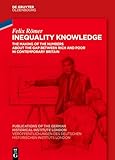Inequality Knowledge : The Making of the Numbers about the Gap between Rich and Poor in Contemporary Britain / Felix Römer.
Material type: TextSeries: Veröffentlichungen des Deutschen Historischen Instituts London/ Publications of the German Historical Institute London ; 89Publisher: München ; Wien : De Gruyter Oldenbourg, [2023]Copyright date: ©2024Description: 1 online resource (X, 377 p.)Content type:
TextSeries: Veröffentlichungen des Deutschen Historischen Instituts London/ Publications of the German Historical Institute London ; 89Publisher: München ; Wien : De Gruyter Oldenbourg, [2023]Copyright date: ©2024Description: 1 online resource (X, 377 p.)Content type: - 9783111100142
- 9783111317274
- 9783111317052
- 305.5
- online - DeGruyter
- Issued also in print.
| Item type | Current library | Call number | URL | Status | Notes | Barcode | |
|---|---|---|---|---|---|---|---|
 eBook
eBook
|
Biblioteca "Angelicum" Pont. Univ. S.Tommaso d'Aquino Nuvola online | online - DeGruyter (Browse shelf(Opens below)) | Online access | Not for loan (Accesso limitato) | Accesso per gli utenti autorizzati / Access for authorized users | (dgr)9783111317052 |
Browsing Biblioteca "Angelicum" Pont. Univ. S.Tommaso d'Aquino shelves, Shelving location: Nuvola online Close shelf browser (Hides shelf browser)
Frontmatter -- Preface -- Contents -- I Introduction -- II The Emergence of a Global Knowledge Regime -- III The Post-War Knowledge Regime, 1948–1972 -- IV The Social Democratic Knowledge Regime, 1973–1979 -- V The Rise and Fall of the Thatcherite Knowledge Regime, 1979–1991/ 99 -- VI Conclusion -- List of Illustrations -- Index of Abbreviations -- Bibliography -- Index
restricted access online access with authorization star
http://purl.org/coar/access_right/c_16ec
Poverty and inequality have pervaded British society to this day, but this has not always been self-evident to contemporaries – popular understandings have depended on existing knowledge. Inequality Knowledge provides the first detailed history of the numbers about the gap between rich and poor. It shows how they were produced, used, and suppressed at times, and how activists, scientists, and journalists eventually wrestled control over the figures from the state. The book traces the making and the politics of statistical knowledge about economic inequality in the United Kingdom from the post-war era to the 1990s. What kind of knowledge was available to contemporaries about socio-economic disparities in Britain and how they evolved over time? How was this knowledge produced and by whom? What did policy makers and civil servants know about the extent of poverty and inequality in British society and to what extent did they take the distributional impact of their social and fiscal policies into account? Far from just a technical matter, inequality knowledge had far-reaching implications for key debates and the wider political culture in contemporary Britain. Historicizing inequality knowledge speaks to a long tradition of historical research about social class divisions and cultural representations of economic disparities in twentieth-century Britain.
Issued also in print.
Mode of access: Internet via World Wide Web.
In English.
Description based on online resource; title from PDF title page (publisher's Web site, viewed 02. Jun 2024)









